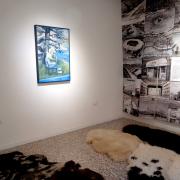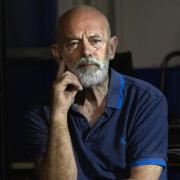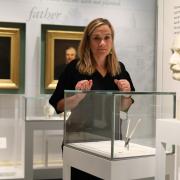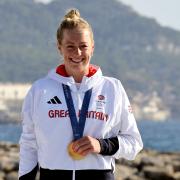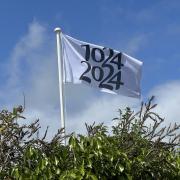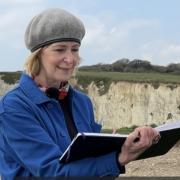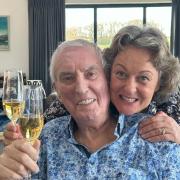Manal and Abdul Tameena arrived at Bristol airport with their two small children in 2017, having fled Syria soon after the civil war started. They’d been given no choice about the country they were moving to and knew little about England. For five years they’d been living in Egypt, where Abdul worked as an accountant for a multi-national tool company. Now their lives were packed into four small suitcases. And what happened next was extraordinary.
‘We were met by people from ICN (Bournemouth’s International Care Network) who had organised a van to take us to our first flat in Sherborne. There, we were greeted by seven or eight volunteers from SHARES (Sherborne Area Refugee Support). They cooked us a meal, filled the fridge with food and furnished the rooms. Everything was good,’ smiles Abdul, who is seated next to Manal in the house they now rent in the town.
The family came to England through the United Nations Resettlement Programme. ‘It took about a year from when we started the interviews,’ Abdul explains. ‘They said, we’ll see which country will take your documents. Eventually they said, UK.’

Manal confesses that she was nervous about the move. ‘I didn’t know much about the culture or the language. My husband did lots of English courses in Egypt as he spoke it at work. But I’d studied Arabic grammar at Damascus University, then I taught Arabic in primary and secondary schools.’
One of the reasons they were able to get onto the programme is because their son, Sulaiman, (now 11) has severe autism. ‘He was very different to his sister, who by then was a year old,’ Manal says. ‘There was no eye contact, and he didn’t sleep much. Just two hours in every 20.’
I ask how they feel, having been able to fly into England when so many people they know have had such different journeys. ‘We weren’t sure we were going to get the resettlement. I thought about going on a boat many times,’ Abdul says, his face grim. ‘In Egypt there is no life for this boy. At three-years-old his arm was broken in a nursery. They ‘said’ he fell from the swing. It wasn’t safe for him. So, I tried hard to get on a boat.'
‘And I argued hard that we couldn’t,’ Manal says.

‘The concern was his safety,’ adds Abdul. ‘Ten days on a boat. Screaming. Challenging behaviour. They may shoot him.’
Many of their family and friends have had to use people smugglers to find sanctuary, including three of Abdul’s siblings who are now in Germany. ‘My friend was nearly the only survivor on a boat from Libya to Italy,’ he adds. ‘Maybe God was helping us. It is a miracle that we got here. The UK government arranged for a doctor to come on the plane with Sulaiman from Egypt to Frankfurt airport to Bristol airport – 36 hours.’
When I say how proud this makes me feel, Abdul’s face lights up. ‘The UK is the best country in Western Europe regarding equality, looking after each other and fairness. From the first day I saw Sherborne I decided, I am never leaving. I am dying here.’

He describes how the town he grew up in, 4km from the Damascus centre, no longer exists. ‘100,000 people lived there. Now it’s gone.’ When Manal was pregnant with Sulaiman, they witnessed more than a 100 people being gunned down in the street. Soon afterwards Abdul transferred his job to Egypt. And Manal went to live with her mother-in-law after their own home was broken into. ‘They stole the furniture then burnt the house down.’
Both their mothers are still in Syria. ‘They struggle with access to electricity, water, money for food,’ Abdul says. ‘It’s hard being here, knowing they are still there.’
The family speak regularly to them via Zoom, and the couple are keen to teach their children about their ancestral home. ‘We watch Arabic television series, and they can see Damascus in films. We also go to mosque in Yeovil, and Sana (who’s now 12) takes Arabic classes.’

However, the pain of having to leave their homeland cuts deep. ‘Even though we’re happy here in Dorset, we still struggle without our families nearby. Sana loves school. But when her friends go to see their grannies, she asks why she can’t do the same.’
Manal’s father used to work in the food industry, and as a little girl she spent time with her mother in the kitchen. ‘Like my daughter now, I would help,’ she smiles. However, it was through her grandmother that Manal first learnt about catering. ‘In Syrian culture a granny will have all the children and grandchildren at home nearly every weekend, so you would be cooking for 20, 30 or 40 people. We’d make huge dishes of Kabsa rice with cinnamon, cloves and black lime, chicken with potatoes and garlic, piles of flatbreads...’
Once they were settled in their Sherborne flat, the Dorset County resettlement team and volunteers from SHARES helped them establish life here, advising on everything from making appointments with the local GP to finding schools and registering with the job centre. Now, they count some of these volunteers as their closest friends. Having tasted Manal’s delicious food, they suggested that she begin a catering business.

So, in November 2022, with Abdul now working as an accountancy technician for Sherborne School Trusts, Alrayan Food was launched. ‘Sana chose the name. It’s what we call really fresh fruit and veg. But Alrayan also means the gateway to heaven,’ Manal says. Truly delicious food, word of mouth (and the tireless marketing efforts of SHARES) meant the business went from strength to strength. Within the first year they did nearly 20 events: in village halls, private parties, and two where most of the profits went to charity.
Every first Saturday of the month, Alrayan Food has a stall at the market in Sherborne’s Digby Hall. Telling me about it, Abdul is clearly proud of his wife. ‘She has a good positive attitude – people always accept her. They accept all of us.’ They’ve had no issues integrating into the community, despite there being relatively few Muslims in the area.
‘When we started people would only glance at the food. But at our last market, a lady tried it and started talking with Manal. Then she said to everyone else, “Come try this food” and they came.’

They’ve also been doing open-invitation meals in local village halls; tickets often sell out fast. As Syrian music plays, guests are treated to a slideshow of photos from the family’s old life, then Abdul introduces his wife and her food to the guests, as Manal and Sana stand behind trays of wonderful-smelling food, waiting to serve it to the guests. There is aubergine muttabal dip, tabbouleh salad, shawarma (a popular street food of chicken in cone-shaped wraps), ful madamas made from broad beans, tomato and garlic, and piles of sweet pistachio baklava.
A fellow Syrian has managed to source the authentic spices and rice they originally struggled to find, and they’ve worked out the best supermarkets to shop for their other ingredients. (Apparently Sainsbury’s does the best olive oil).
The couple clearly centre their lives around their children. Their second son, Amr was born in 2020. And Sana currently wants to be an astronaut. Sulaiman is currently in a residential home in Weymouth – he comes home every weekend - but they’ve recently heard that it’s due to close, which is a worry for them. ‘He doesn’t speak,’ says Abdul. ‘In the residential home they communicate with pictures and photos. He points to show what he wants, how he’s feeling.’ Abdul’s face falls. ‘My priority is Sulaiman. After what we’ve been through, this is what matters.’

When I ask what can be done to help refugees, his answer is pragmatic. ‘I can’t tell one country, or 20 countries to take all the refugees – it’s impossible. Help prevent wars, stop selling weapons, have more ethics and morals. It’s better to keep everyone living safely in their own country.’
Manal invites me to come and cook with her at their house in Sherborne. We spend several happy hours filled with lots of laughter – not least because she refuses to follow my plan of cooking from another Syrian chef’s recipes – The Sunday Times bestseller Imad's Syrian Kitchen: ‘Why you send me the book? I know how to cook!’ she declares, before we start cooking her family recipes. We make more-ish Syrian flatbreads sprinkled with za’atar - a blend of herbs and spices including thyme, oregano, toasted sesame seeds, sumac, cumin and coriander, each family has their own version, then chicken with tomatoes and potatoes. All utterly delicious. Afterwards I receive a text from Manal, thanking me for a lovely morning – even though she provided the food. ‘It was so nice to cook together,’ she says. ‘Just like I used to do back home.’ ENDS
Find them on Facebook @alrayanfood where you can find out what events they have coming up and what’s on their current menu. For private catering call Manal on 07585 347082. SHARES welcomes volunteers, contact them via sherbornearearefugeesupport.org.uk









